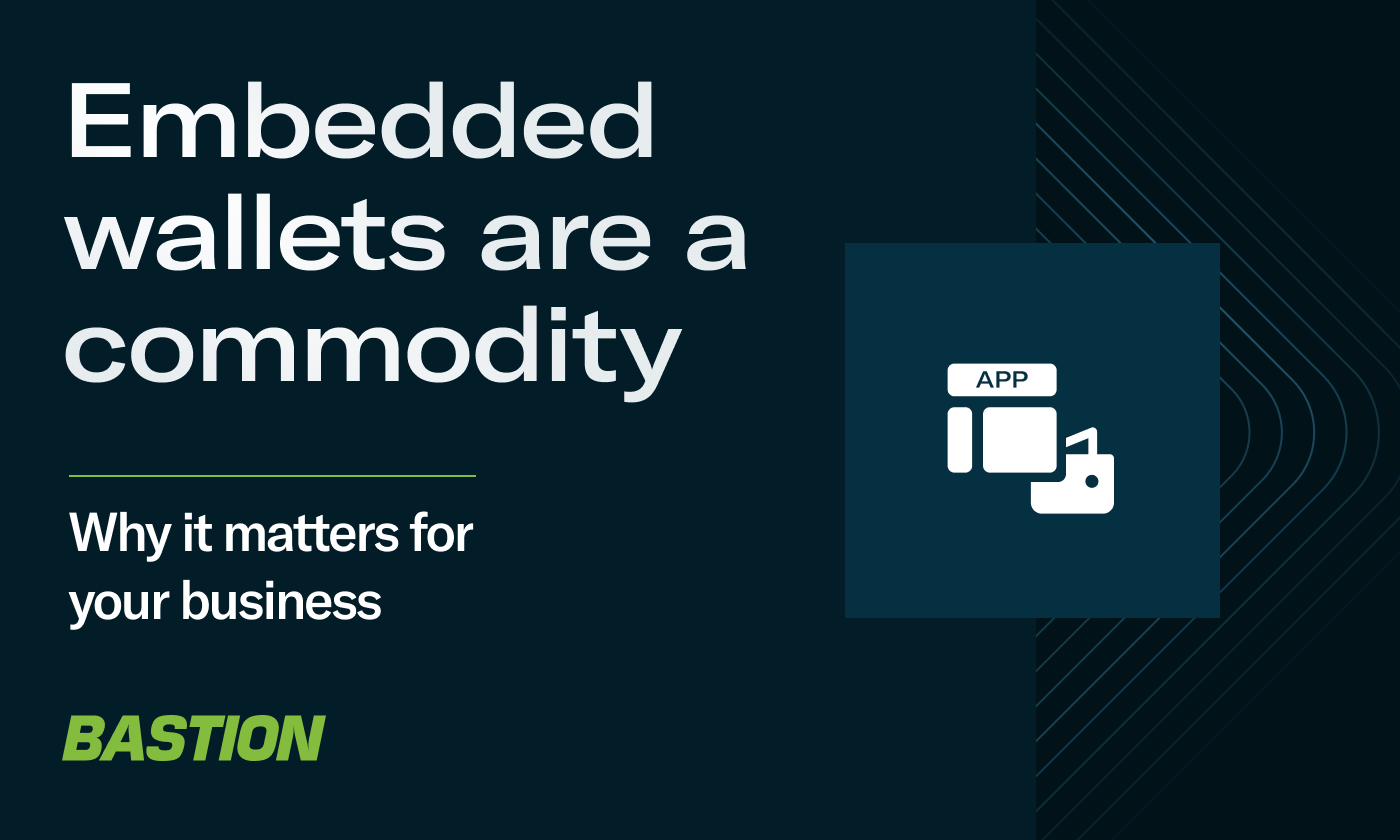
Web3 technology changes constantly and the proliferation of embedded wallets is a prime example of that, one that has been both remarkable and overwhelming in its scope. As we dive deeper into this new frontier, it's clear that the market is saturated with options.
With more than 30 key players, including Privy, Dynamic, Capsule, Magic, and Web3Auth, competition is fierce — and that means differentiation is crucial. Unfortunately, most of the focus has turned to surface-level features that, while seemingly impressive, don't necessarily translate into tangible benefits for businesses.
This observation begs the question of where the real value of embedded wallets lies. The answer is, surprisingly, not in the wallets themselves — but rather in the ecosystem of services built upon these digital foundations. That means it's the job of CEOs, founders, and product leaders to look beyond the basics of authentication methods, key management, multi-chain support, and customizable widgets. These features, although important, barely scratch the surface of what's possible.
As we dive further into this discussion, it's essential to understand that the future of embedded wallets and their impact on businesses and consumers alike hinges on the development of a more comprehensive platform. That’s one fundamental view behind Bastion: We believe in a platform that extends beyond the rudimentary functions of a wallet to instead offer a suite of services that truly revolutionizes how we interact with digital assets and web3 technology. That is actually the key to unlocking the power of wallets — and below, we’ll explore why.
The credit card analogy: Why wallets need to be more than just wallets
To understand why embedded wallets need to offer more than just basic wallet functionality, it's instructive to look at the history of credit cards.
The first credit card was introduced by Diners Club in 1950, allowing members to pay for meals at participating restaurants. However, it wasn't until the launch of American Express' first credit card in 1958 that the concept really took off.
What set American Express apart was the additional services it offered on top of the basic payment functionality. This included things like travel insurance, concierge services, and later on, rewards programs like Membership Rewards, launched in 1991.
Over time, these additional services became the key differentiator between different credit card providers. While the basic payment functionality was largely commoditized, the value-add services were what convinced consumers to choose one card over another.
The same dynamic is playing out in the world of embedded wallets today. Basic wallet functionality like key management and transaction signing is becoming commoditized, and the real value lies in the additional services that can be built on top.
This includes things like:
- Identity and compliance (KYC, AML)
- Transaction routing and gas optimization
- Loyalty and rewards programs
- Lending and borrowing (collateralized by crypto or other digital assets)
- Seamless fiat on-/off-ramps
- DeFi integrations (staking, yield farming, etc.)
Businesses that are able to offer these types of value-added services on top of a solid wallet infrastructure will be the ones that win in the long run.
The current landscape: A crowded space with limited differentiation
Today, the embedded wallet and WaaS space is crowded. Each provider brings something unique to the table, but the common focus areas are:
- Authentication methods (social sign-in, passkeys)
- Key management (on-device, MPC, secure enclaves, HSMs)
- Multi-chain support
- Customizable widgets
While these features are important, they don't address the broader challenges businesses face when entering the web3 space.
Authentication methods, for example, can slightly improve onboarding friction but don't fundamentally change the user experience or enable new business models. Most users aren't tech-savvy enough to appreciate the nuances between auth methods to begin with. As long as it's secure and not cumbersome, the specific approach matters less than the overall UX and utility.
Similarly, key management methods like MPC, enclaves, and HSMs are important for security, but are not major differentiators when it comes to the user experience. The end user doesn't know or care how keys are stored behind the scenes. All major approaches are secure enough for most business needs, and edge cases like HSMs for high-value institutional custody don't apply to most embedded wallet use cases.
From a technical standpoint, MPC allows for distributed signing of transactions without any single party ever having access to the full private key. This is achieved through advanced cryptographic techniques like Shamir's Secret Sharing and threshold signatures. However, the specific MPC implementation (e.g., GG-20, MPC-CMP) matters less to businesses than the result of secure, distributed key management. And many companies will see no difference between MPC, Shamir's Secret Sharing, and a more centralized key management system that Apple or Google use across millions of servers.
Enclaves, whether hardware-based (Intel SGX) or software-based (ARM TrustZone), provide isolated execution environments for sensitive operations like key management. But again, the specific enclave technology is less important than the overall security and reliability of the wallet platform.
Lastly, there’s the issue of cost: most wallet providers charge based on MAUs, or monthly active users. This is a loosely defined term, but usually it means that businesses get charged even if someone signs up but never really makes transactions, contributes to the platform, or is an actual valuable member of the community from a business perspective.
Taken together, it’s clear that the focus on the nitty gritty differentiators may not be all that impactful for end users or businesses. In effect, it may distract from the most important issues decision makers should be thinking about.
The core gaps: Compliance, gas fees, slow transactions, and beyond
One critical aspect that many WaaS providers gloss over is compliance. Running afoul of AML/KYC regulations could lead to large fines or being shut down, making compliance an existential issue for businesses. But few providers touch the subject, and in essence, wind up passing the buck to their customers.
One other core issue is high gas fees and slow transaction speeds. These obstacles hinder blockchain’s wider adoption and industry growth, which is something many providers treat as not their problem to solve.
Gas fees, or the costs for computational energy to process transactions, have skyrocketed, posing big challenges for businesses and individual users alike. Even with advances with Layer-2 and Layer-3 scaling solutions, gas fees can be prohibitively expensive for businesses to bring their apps on-chain.
Additionally, slow transaction speeds have created bottlenecks, slowing down blockchain operations. While incredible progress has been made to bring transaction times to seconds from minutes, web users are accustomed to processing times in the hundreds of milliseconds, an order of magnitude away. In an era that values speed and efficiency, these delays can damage the trust and reliability of blockchain technology as a whole.
Lastly, when considering the wallet provider ecosystem as a whole, there’s another common gap: The data and insights businesses need to understand what’s actually happening on their platforms. In the world of web2, businesses know how essential it is to see user activity, what’s working and what’s not, and make informed decisions — all based on data, and on being as close to their users as possible. Unfortunately, web3 can often feel like a black box, with little-to-no visibility offered into what’s happening. This is simply not something most wallet providers have invested in despite its mission-critical importance.
The Bastion philosophy: more than just a wallet
There’s a big picture takeaway here about the need for a platform that addresses a comprehensive set of business needs, and can scale with a company as it grows. And that’s why we designed Bastion differently.
To start, our regulated wallet APIs don’t fall under the status quo pricing model: Wallet creation is unlimited, and 100% free. Beyond that, we focus on these core value-adds that we believe are essential for businesses.
Compliance
Bastion proactively handles sanctions screening and transaction monitoring. Regulatory clarity is key for institutional B2B customers, and just as Stripe built a trusted business by getting Money Transmitter Licenses, Bastion too is building legitimacy through compliance.
From a technical perspective, Bastion's compliance stack is built on best-in-class controls that automate sanctions screening and transaction monitoring. Bastion utilizes robust KYC controls to ensure that it truly understand's its customers and manages the compliance risks to its customers and its platform.
By taking a proactive approach to compliance and baking it into the core of the platform, Bastion is able to offer a truly differentiated value proposition to businesses operating in regulated industries.
Gas fees and transaction times
We aim to drastically reduce gas fees — taking things from prohibitively expensive to almost zero — while creating optimal transaction times, ultimately ushering in a more accessible and efficient blockchain ecosystem. With Smart Transaction Routing, we’ve created the world’s first system that decides if transactions should occur on-chain or off-chain. This approach, part of an advanced settlement system, ensures activities are interoperable within the blockchain — while significantly cutting costs and reducing confirmation times to near zero, enhancing efficiency and accessibility for blockchain users.
Focusing on these key issues, Bastion not only improves the user experience but also enables new blockchain applications and use cases that were previously too costly or slow, both for users and businesses. Through these efforts, we strive to create a seamless, affordable, and rapid blockchain network that meets the industry's growing needs and promotes its ongoing expansion.
By tackling these fundamental challenges, we hope to enhance the current ecosystem and pave the way for its future success and prosperity. It’s truly a rising tide lifts all boats philosophy: We want to win when our customers win, and we want the industry as a whole to advance and grow.
Data
Bastion's goal is to offer a universal wallet as a service that is more than just a convenience for users. It represents a paradigm shift in how businesses understand and serve their customers. With Bastion, businesses can capture information across various facets of customer activity, including:
- Financial data: By having visibility into a customer's complete financial profile (crypto, fiat, loyalty points, etc.), businesses can tailor their offerings and make more informed decisions around credit risk, pricing, and product development.
- Identity data: Bastion enables businesses to integrate with decentralized identity solutions like DIDs and VCs. This allows for secure, privacy-preserving authentication and authorization, while giving businesses the necessary KYC/AML information to comply with regulations.
- Commerce data: Understanding a customer's spending patterns and preferences across different types of assets and platforms is invaluable for targeted marketing, inventory management, and demand forecasting.
- Social data: Insights into a customer's social connections and interactions can help businesses identify influencers, measure brand sentiment, and drive viral growth.
- Education data: Knowledge of a customer's learning and skill development journey can inform career services, job matching, and personalized content recommendations.
This holistic view is critical in the age of AI, where the quality and breadth of data directly impact the effectiveness of machine learning models and business intelligence. The importance of this comprehensive customer understanding cannot be overstated, especially as third-party tracking cookies are increasingly being blocked. Businesses relying solely on external data sources will be at a disadvantage compared to those leveraging first-party data from a universal wallet.
Choosing the right provider for long-term success
As the web3 landscape continues to evolve, businesses need to look beyond basic wallet features when choosing a provider. Compliance, cost-efficiency, and user experience are all critical factors for sustained growth..
We believe our comprehensive, compliance-first approach is uniquely positioned to help businesses navigate the complexities of web3. By providing a universal wallet accessible as a service across all asset types and networks, Bastion is helping businesses unlock new opportunities for revenue generation and growth.
And if you’re looking for the right wallet solution, feel free to get in touch. We’d love to learn more about what you’re building and how we can help.
